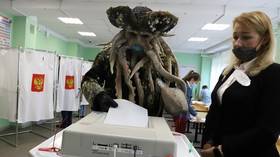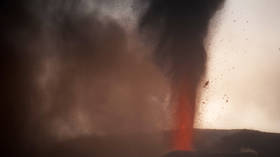The Church of Navalny: Western media fan club are damaging Russia's opposition with their religious-like faith in jailed activist

Judging by Western reports of Russia's elections last week, the Communists didn't even take part. Instead, 'Navalny-backed' candidates came close to a historic victory and were robbed of success. But the reality is very different.
One of the most important elements in determining the nature of any debate is how the parties in question frame the issue. If your preferred framing becomes the norm, then you're a good way towards winning the argument. At the same time, the contexts people put forward tell us a lot about their attitudes.
As pundits debate the significance of last week's election to the Russian State Duma, two narratives have come to dominate English-language media: jailed opposition figure Alexey Navalny, and fraud. The two are connected. In the dominant framing, the election had two major players: on the one hand, the state, in the form of the United Russia party; and on the other hand, the opposition, led, we are told, by the anti-corruption campaigner beloved by Western commentators.
Also on rt.com Russian elections: Pro-Putin party loses support but keeps ‘supermajority,’ Communists get big boost but allege count was riggedAccording to the prevalent theme, the latter, through his tactical voting scheme known as "Smart Voting," was on the verge of a historic success when he was defrauded by the state through mass falsification of results, especially those in Moscow.
In reality, Navalny and his team were unable to put up candidates for election, and few of those standing wished to be associated with them. They were nowhere on the ballot, and anybody too closely associated with him had been prohibited from standing under rules regulating so-called "extremist organizations," a label that has been applied to their Anti-Corruption Foundation.
By contrast, 13 non-government parties did put up people to compete against United Russia, seven of which won seats: the Communist Party of the Russian Federation; the Liberal Democratic Party of Russia; Fair Russia; New People; Yabloko; Civic Platform; and the Party of Growth. The last three only got one seat each, but the others got substantially more. Indeed, the Communists amassed nearly 20% of the total vote, putting them in second place behind United Russia, which attracted just shy of half of all ballots cast.
One would imagine, therefore, that any reporter wanting to provide an accurate framing of the election would describe it in terms of a competition between United Russia and the Communists; focusing on the Communists' good showing (up several percentage points since the last election); and insofar as election fraud in favour of United Russia is discussed, would point out how the Communist Party is leading the charge to declare a swathe of results invalid.
They might also want to explain why: The Communists led the opposition to last year's Constitutional changes that opened the door for Vladimir Putin to potentially serve two more presidential terms. They also campaigned against deeply unpopular pension reforms, measures which divided the pro-Western liberals.
But not a bit of it. In some English-language reports, one would struggle to know that the Communists even took part.
Take, for instance, an article summarizing the election results published by US state-run broadcaster RFE/RL, entitled "A Win For United Russia? A Loss for Navalny's Smart Voting? Five Takeaways from Russia's Elections." The title immediately makes RFE/RL's framing of the election clear: it was a battle between the government and Navalny. The article then hammers home the point. It mentions the name "Navalny" 13 times (15 if you count the captions in an embedded picture and video). By contrast, the Communist Party – which, you will recall, won nearly 20% of the vote – is not mentioned even once.
As framings go, it's oddly divorced from reality. But it's far from unusual. An article published on Wednesday by Qatar's state-run Al Jazeera takes much the same approach. Written by the Latvia-based Leonid Ragozin, the article uses the word "Navalny" eight times and throws in another four references to "Smart Voting" for good measure. Once again, we're made to believe that there were only two options open to Russian voters: United Russia or Navalny.
Unlike his comrades at RFE/RL, Ragozin at least mentions the Communist Party, but only once, and even then only to remark that its "considerable gains" were "likely thanks to pro-Navalny votes." At this point, Ragozin moves the frame into the realm of pure fantasy, suggesting that the millions of Russians who voted for the Communist Party of the Russian Federation were in fact voting for Navalny. There is, of course, no evidence for this. Communist voters weren't "pro-Navalny", they were "pro-Communist."
What's more, the Communists were surging in opinion polls for weeks before Team Navalny opportunistically supported most of their candidates... two ahead of the election. Navalny's "Smart Voting" scheme encouraged anti-United Russia voters to cast their ballots for Communist candidates in a majority of the country's 225 single member constituencies. But the Communists won very few of those. Where they made their gains were in the 225 seats that are assigned via party lists according to the overall percentage of the vote received. But "Smart Voting" played absolutely no role in the party list segment of the election.
In short, the Communists' successes had nothing to do with Navalny at all.
This obvious truth hasn't stopped numerous commentators from discussing allegations of electoral fraud in terms of United Russia defeating "Smart Voting candidates" or "Navalny-backed candidates." Navalny was about to win, it is implied, until the Russian state wielded its powers to falsify the result and clutch victory from his hands. But Navalny was never going to win. Insofar as any of the defeated candidates were "Navalny-backed" it was only by means of an online recommendation issued just before the election. Ragozin claims that the results show that, "Putin has lost the Russian capital." But even if that's true (which is highly debatable), he's lost it to the Communist Party, not to Navalny, the liberals, or anybody else one can imagine Ragozin approving.
Also on rt.com Opposition figures in Moscow cry foul after city's election monitors find 'no trace of tampering' in parliamentary vote countThe curious way in which the Russian elections have been framed tells us a lot about the obsessions of the Western media and many of those who dominate social media commentary on Russia. Rather than being committed to an objective description and analysis of events, they have become in effect mouthpieces of Team Navalny, boosting it at every opportunity. Driving this seems to be a cult-like faith in the cause that assigns almost magical powers to its leader.
But while the media may truly believe in what they are doing, many in authority, in Moscow, seem to think that this mode of narrative curation is not the product of some sort of politico-religious faith but rather is part of a coordinated plan by foreign governments to subvert the Russian state. This logic strengthens the perception that the Russian opposition is a Western-backed fifth column, thereby justifying, in their eyes, repressive measures against it. In the end, therefore, the endless attempts to frame stories in terms of Navalny do nobody any good, not least the Russian opposition itself.
Think your friends would be interested? Share this story!
The statements, views and opinions expressed in this column are solely those of the author and do not necessarily represent those of RT.















